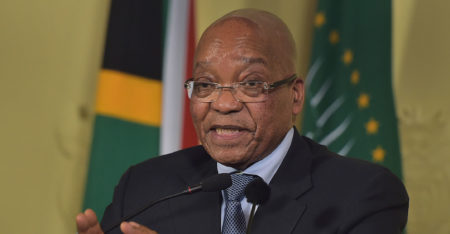
A political firestorm over an aborted attempt to charge finance minister Pravin Gordhan with fraud has ignited a power struggle between the head of a special police unit that carried out the investigation and the nation’s chief prosecutor, deepening a crisis in the criminal justice system.
The battle came to light in an exchange of letters in which Berning Ntlemeza, the head of the Hawks police unit, accused chief prosecutor Shaun Abrahams of bowing to political pressure when he dropped the charges against Gordhan, and Abrahams suggested the police withheld information pertinent to the case.
Two civil rights groups have filed lawsuits aimed at forcing both men out of their jobs. On Tuesday, President Jacob Zuma said he’d asked Abrahams to explain why he shouldn’t be suspended.
The latest dispute signals the widening fallout from the feud between Gordhan and Zuma over the management of state companies and the affordability of nuclear power plants the president wants to build.
Gordhan said allegations that he illicitly approved the early retirement of a tax agency official and then allowed his rehiring on a contract basis are baseless and being driven by people intent on raiding the treasury. Opposition parties allege Zuma wanted to use the fraud case as a pretext to name a more pliant finance minister.
Zuma is incredibly lucky because he is benefiting from the law of unintended consequences
“It shows how institutions are being eroded,” said Roland Henwood, a politics lecturer at the University of Pretoria. “It shows a lack of a coherent decision-making process.”
As a result, the nation’s courts are increasingly being called upon to be the final arbiter of political disputes.
Zuma faces a dilemma in what to do about Abrahams. While the prosecutor’s handling of the Gordhan case has sparked widespread criticism, he’s helped shield Zuma from graft charges that were dropped just weeks before he became president in May 2009, said Theo Venter, a political analyst at North West University in Potchefstroom.
The supreme court of appeal is hearing a lawsuit filed by the main opposition party, the Democratic Alliance, aimed at forcing prosecutors to reinstate the charges against Zuma.
“I don’t think Zuma can afford to get rid of Shaun Abrahams,” Venter said. “Shaun Abrahams is all that stands between Zuma and 783 charges.”
At the same time, the latest lawsuit by the two civil rights groups, Freedom Under Law and the Helen Suzman Foundation, has given Zuma and his supporters the opportunity to assert their control over the national prosecutor, indicated by the request for him to explain why he shouldn’t be fired, according to Ralph Mathekga, a political analyst at the Mapungubwe Institute of Strategic Reflection, a Johannesburg-based research group.
“They are learning from their mistakes; these people are not dumb,” he said by phone. “Abrahams failed in the key job, which involves prosecuting Pravin Gordhan.”
Zuma’s quarrel with Gordhan started soon after he was forced to appoint him in December after his decision to replace the respected Nhlanhla Nene as finance minister with a little-known lawmaker went awry, triggering a run on the rand and the nation’s bonds and criticism from business leaders and members of his ruling ANC.
Since then, the president has taken a number of knocks. In March, the constitutional court found that he violated his oath of office by refusing to repay taxpayer money spent on his private home. In municipal polls in August, the ANC suffered its worst electoral performance since the end of apartheid in 1994, losing control of three key cities, including Pretoria and Johannesburg.
They are learning from their mistakes; these people are not dumb
While Zuma may have his own reasons to publicly question Abrahams’ performance, the indication that he’s considering suspending him should be welcomed, said Piet Olivier, a legal researcher at the Helen Suzman Foundation.
“I don’t think one should defend someone who is unfit for his post, even if he is being removed for the wrong reasons,” Olivier said.
The civil rights groups say Abrahams and two of his subordinates demonstrated their incompetence by bringing the unfounded charges against Gordhan. The high court in Pretoria is due to hear their lawsuit aimed at forcing Zuma to suspend Abrahams on 24 November.
In an affidavit filed on Wednesday, Zuma argued that the lawsuit was premature because he’s already begun inquiring whether the three prosecutors were fit to hold office, and the court should allow the process to unfold. Claims that other critical prosecutions and investigations could be jeopardised if Abrahams and his colleagues remained in their post were unfounded, he said.
In their court papers, the three officials denied any wrongdoing.
Ntlemeza too has legal troubles. The high court ruled last year that he was untrustworthy and lied under oath, and he’s facing a court hearing in December. He denies wrongdoing.
For now, the main beneficiary of the standoff between the National Prosecuting Authority and the Hawks is Zuma, said Mathekga.
“Zuma is incredibly lucky because he is benefiting from the law of unintended consequences,” he said. The civil rights groups’ lawsuits presented him with “an incredible opportunity for him to get rid of a director of public prosecutions who seems to yield to public opinion.” — (c) 2016 Bloomberg LP




